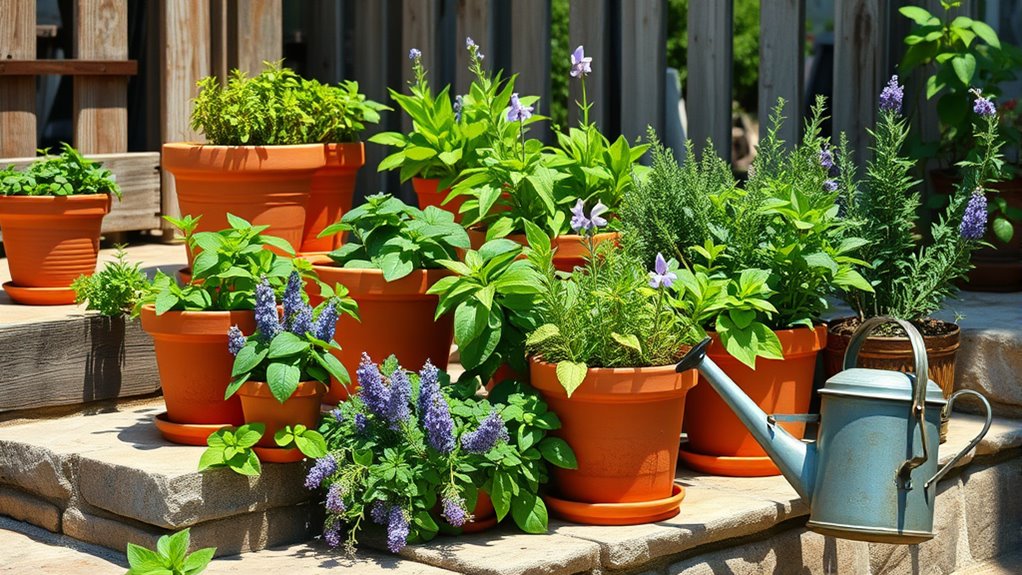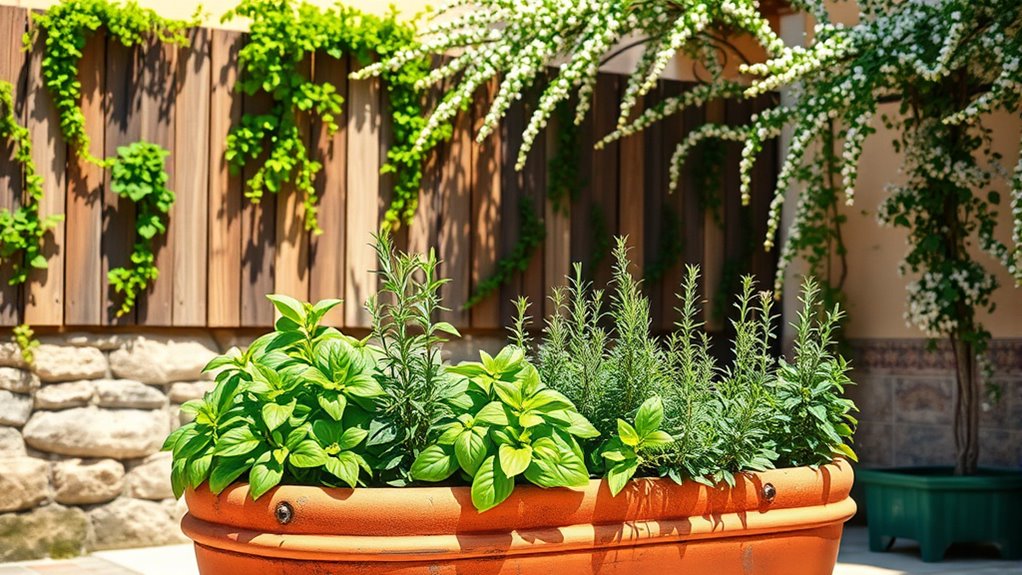To build a traditional Italian herb garden, choose a sunny location with at least six hours of daily sun. Prepare the soil by removing weeds, loosening it, and mixing in compost or manure for nutrients and drainage. Plant herbs like basil, oregano, thyme, and parsley nearby, considering companion planting to boost growth and repel pests. Regular watering, mulching, pruning, and monitoring for pests help keep your garden healthy. Keep exploring these tips to turn your space into an authentic Italian herb paradise.
Key Takeaways
- Select a sunny, well-drained location with at least 6 hours of daily sunlight.
- Prepare the soil by clearing debris, loosening, and enriching with compost or organic matter.
- Incorporate essential herbs like basil, oregano, thyme, rosemary, and parsley, grouping compatible plants together.
- Use mulch to retain moisture, control weeds, and promote healthy growth.
- Maintain consistent watering, prune regularly, and monitor for pests to ensure a thriving herb garden.

Creating your own Italian herb garden is a rewarding way to bring fresh flavors directly to your kitchen. To guarantee your herbs thrive, you need to focus on proper soil preparation and smart companion planting. Soil preparation is the foundation of a healthy garden. Start by choosing a location with ample sunlight, ideally six hours or more daily. Once you’ve selected your spot, clear away weeds and debris, then loosen the soil with a garden fork or tiller. Incorporate organic matter, such as compost or well-rotted manure, to enrich the soil and improve drainage. Italian herbs like basil, oregano, and thyme prefer well-draining soil that’s slightly alkaline to neutral, so testing your soil’s pH can help you make necessary adjustments. If your soil is too acidic, add lime; if it’s too alkaline, incorporate organic matter or sulfur to balance the pH. Proper soil preparation not only promotes healthy root growth but also reduces the risk of diseases.
Companion planting is equally essential in building a successful Italian herb garden. By pairing herbs thoughtfully, you can enhance growth, repel pests, and improve flavor. For instance, basil benefits from being planted near tomatoes and peppers, as it can improve their growth and flavor while deterring pests like aphids and whiteflies. Oregano is a natural companion for beans and carrots, helping to keep pests at bay and encouraging healthy development. Thyme pairs well with cabbage and other brassicas, offering pest resistance and improving soil health. When planning your garden layout, consider the specific needs and benefits of each herb, grouping those that support each other. This practice not only boosts plant health but also maximizes space and simplifies maintenance.
As you plant, keep in mind that each herb has different watering and light requirements, so observe your garden regularly. Mulching around your herbs can help retain moisture, suppress weeds, and keep soil temperatures stable. Water your garden consistently, ensuring the soil stays moist but not waterlogged, especially during hot, dry spells. Regularly check for pests and diseases, and prune your herbs to promote bushier growth and better airflow. Building an Italian herb garden isn’t just about planting; it’s about creating a balanced ecosystem where each herb supports the others. Proper soil preparation and strategic companion planting lay the groundwork for a lush, productive garden. With patience and care, you’ll enjoy a fragrant, thriving herb garden that supplies fresh flavors for your culinary adventures all season long.
Frequently Asked Questions
What Are the Best Italian Herbs for Beginners?
If you’re starting with Italian herbs, choose beginner-friendly options like basil, oregano, and parsley. These herbs are easy to grow and versatile for culinary uses, enhancing your dishes with fresh flavors. To preserve them, try herb drying techniques, which allow you to enjoy their aroma year-round. Focus on these simple herbs first, and you’ll quickly enjoy the benefits of a flavorful Italian herb garden.
How Often Should I Water My Italian Herbs?
Watering your herbs might seem simple, yet balancing between drought and overwatering creates a delicate dance. You should establish a consistent watering schedule, typically every 2-3 days, adjusting for weather and soil moisture. Keep soil moist but not soggy, checking the top inch regularly. Proper watering guarantees healthy growth, flavor, and resilience. Remember, attentive care transforms a basic garden into an authentic Italian herb haven.
Can I Grow Italian Herbs Indoors?
Yes, you can grow Italian herbs indoors. Make sure your space has adequate indoor lighting, like south-facing windows, or supplement with grow lights. Choose herb containers with proper drainage and size for your plants. Regular watering and good air circulation are essential. With these steps, your herbs will thrive indoors, giving you fresh flavors for your Italian dishes year-round.
Which Soil Type Is Ideal for Italian Herb Plants?
Sure, because choosing the perfect soil is just a trivial detail, right? Italian herbs thrive in well-draining soil with ideal compost requirements, so you should aim for a loamy mix. Keep soil pH levels between 6.0 and 7.0 for maximum growth. Avoid heavy clay or overly sandy soils, as they can hinder root development. A balanced, slightly acidic to neutral soil gives your herbs the best chance to flourish.
How Do I Prevent Pests in My Herb Garden?
To prevent pests in your herb garden, you should practice companion planting by pairing herbs like basil with others that repel pests, such as marigolds. Use organic pest control methods, like neem oil or insecticidal soap, to keep bugs at bay without chemicals. Regularly inspect your plants for early signs of pests and remove affected leaves. These strategies help create a healthy, pest-resistant environment for your herbs to thrive.
Conclusion
So, now you’ve got your Italian herb garden all set up—ready to impress with basil, oregano, and thyme. Who knew that a few simple plants could transform your cooking and your space? Just remember, all that effort might make you a little too confident in your culinary skills. But hey, if you accidentally grow more herbs than you can use, at least your kitchen will smell like Italy—no passport needed!









